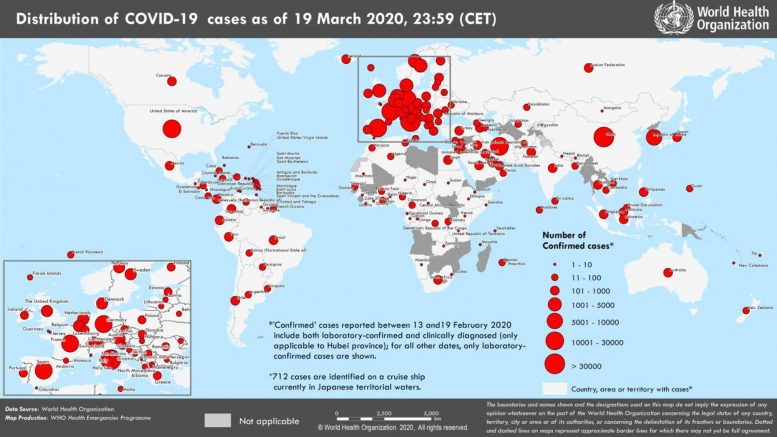Over the last two months our perception of COVID-19 has been constantly changing, and with it, our internal and  external reactions. When mostly isolated in China, it was something foreign, distant, and therefore not very threatening. But as its territory gradually started to expand, infecting people of our nationality, then appearing on our soil, then spreading exponentially, and soon directly affecting our lifestyles, it became a very real threat. Perhaps you are reading this from your own home when usually you would be at work. Maybe you’re lacking in toilet paper or hand sanitizer because the shelves were empty (or maybe you helped empty the shelves). Perhaps you personally know someone infected, or are one degree away, as I recently heard of the death of a friend’s mother. Maybe a tickle in your throat makes you worry that it caught up with you.
external reactions. When mostly isolated in China, it was something foreign, distant, and therefore not very threatening. But as its territory gradually started to expand, infecting people of our nationality, then appearing on our soil, then spreading exponentially, and soon directly affecting our lifestyles, it became a very real threat. Perhaps you are reading this from your own home when usually you would be at work. Maybe you’re lacking in toilet paper or hand sanitizer because the shelves were empty (or maybe you helped empty the shelves). Perhaps you personally know someone infected, or are one degree away, as I recently heard of the death of a friend’s mother. Maybe a tickle in your throat makes you worry that it caught up with you.
Throughout the ever-evolving state of affairs, there has been a wide spectrum of reactions. Early on there was far less anxiety, but at least some could only picture the worst-case scenario. On the other end, complete denial contributed to some countries falling short in preparing for potential risks, leading to current shortages in medical resources. But even if some of those who were more worried about the outcome turn out to be more accurate (now telling their friends, “I told you so!”), the extended state of heightened anxiety may have had detrimental effects on their own mental and physical health, leading to a weakened immune system and a higher risk for a more severe reaction to infection.
What Makes Us React Differently?
First of all, it is important to differentiate between fear and anxiety. Fear is a present reaction to immediate danger, a real threat, and triggers our bodies to go into self-defense mode (fight, flight, or freeze). It is important for our survival, facilitating the avoidance of true danger! Anxiety, on the other hand, is primarily worry about the future, what might happen. Sometimes, if the negative expectations come to pass, it too could contribute to survival. But it is not necessarily based on scientific reasoning and fact-based threat analysis. Instead, it is a cycle of keeping the body in high alert mode, creating hyper-awareness to any information that supports the possible threat, and reinforcement of physical, emotional, cognitive, and spiritual reactions to the perceived threat. When the threat becomes real, those with a history of anxiety and/or persistent stress have a brain wired to react more strongly to that threat.
For everyone, several factors contribute to an increase in fear and anxiety: 
- Proximity: When a threat gets nearer, our fear increases. This is evident as the change in geographical location influenced the attitude toward the threat of COVID-19.
- Severity: The more drastic the potential outcome is, the stronger a reaction it triggers. Rates of mortality and ease of spreading the infection affect how the danger is perceived as a threat. Those with higher vulnerability (e.g. the elderly, those with other health concerns) may have a greater level of fear of contracting COVID-19.
- Society: The more people around us express the fear, the higher our own levels increase. For many, the constant negative input from the news and social media (whether accurate or not), fuels the increase in fear. Influence on our own feelings is even stronger when those in close proximity are demonstrating fear; in contrast, being around others who to offer reassurance can have a positive effect and reduction of fear. Something as simple as a hug directly affects the chemicals in our brains, which is becoming more difficult with a significant reduction of close proximity.
- Previous experience: Many who have experienced fear in the past will have those emotions triggered. It could be related to something specific, like disease, but it also might be more broad, having gone through periods of uncertainty, isolation, unmet needs, etc. The more anxiety and fear we have experienced so far, the more our brains are sensitive to potential threats.
- Helplessness: The less control we have over a situation, the higher the levels of anxiety because of the uncontrollable outcome. A new disease like COVID-19 is worrisome because of our lack of knowledge, triggering immediate research on patterns of the spread of infection, searching for effective treatment, developing a vaccine, etc. The inability to acquire resources, such as masks and ventilators, increases the threat of a more severe outcome.
These factors are sometimes beneficial in triggering positive, necessary action. Even social pressure through Facebook has contributed to motivating the general population to observe social distancing for the good of society, not just the individual. People at all levels of influence are taking steps forward, reducing feelings of helplessness and striving to meet needs. The outcomes may have been more effective if started earlier, but everyone’s choices still will have an influence on the long-term picture.
Finding a Balance
Several years ago, I was in an African country about to have a presidential election. The most recent one had quickly turned violent, with many lives lost, and no one wanted to see it happen again. A number of expats decided to leave the country to avoid the potential danger. Companies and organizations varied in their policies for addressing risks, but most had a plan of action in place to implement if the levels of danger increased. In our organization, we were told, “Prepare for the worst, pray for the best.” We stocked up on non-perishables and bottled water in case it became too dangerous to leave the compound. There were radios in case cell service was cut off. We had specific locations to meet if it got to the point where evacuation was necessary. Fortunately, while there were riots around the city, it never reached the same level of violence as five years earlier and relatively quickly calmed down. But that mandate stuck with me.
Prepare
Living in denial can have negative ramifications. Let’s take all the information we have seriously. Some countries found out the hard way that preventative action would have been most effective (or are realizing it now). But we can’t undo the past, and must therefore focus on immediate next steps. Some are fairly simple: social distancing and hygiene will decrease the rate of spreading the virus. This is about the well-being of those who are most vulnerable, as well as society in general. When the health care system has exceeded its capacity to provide needed services, the impact is widespread, as evident in Italy, a developed nation with more resources than many.
We also need to be active on an individual and familial level. Prepare for the coming days, weeks, even months from a holistic approach:
~ Physically: The healthier you are the better! The majority of COVID-19 cases have mild to moderate symptoms. That is influenced by our immune systems’ capacity to fight the virus. Sleep is critical. Hopefully you’ve stocked your shelves with healthy food. Be careful not to let “comfort food” become your primary way of managing stress. Stay active. Get some good doses of sunlight and fresh air.
~ Cognitively: “Whatever is true, whatever is honorable, whatever is right, whatever is pure, whatever is lovely, whatever is of good repute, if there is any excellence and if anything worthy of praise, dwell on these things” (Philippians 4:8, NASB). Be careful where you place your focus! It’s very easy to stay glued to the news, but not always helpful. I appreciate it when I see posts of humor—laughter is healthy! There is an abundance of free online resources to explore places you’ve never been, take courses, and explore new topics. But what is most valuable in influencing our thought patterns is spending time with God. Read His word. Listen. Give your concerns to Him, asking for His help. Remember that He is still Sovereign, even when we don’t understand what is going on around us. Take time to express gratefulness for what He is doing in you, around you, and through you.
~ Emotionally: Be real with yourself. Emotions are normal! Yet, sometimes ongoing negative emotions are taxing. Notice what triggers those emotions and identify what has in the past brought feelings of joy and peace. Go back to the positive memories of times with people you love, times when you felt the presence of God. Know your emotional needs. When feeling overwhelmed, stop and breath slowly. Notice how your body stores tension and find ways to relax. Explore ways of using creativity to express your emotions.
~ Relationally: Even if we are purposefully keeping distance from one another, the reality is we need each other. God made us relational! If social isolation is taking its toll, identify creative ways of connecting with people: calls, “real” letters or cards, video chat, online games, etc. Think also about the needs of others. Who in your family would really appreciate a phone call right now? Physical touch is not the only “love language.” Acts of service can be done from a distance, gifts can still be delivered, words of affirmation come in many ways, and quality time may even be through a conversation from a distance. Technology today has given us many resources to connect!
~ Spiritually: All of the above pieces are related to our spiritual well-being. When caring for our bodies we must remember that they are “temples of the Holy Spirit.” God’s Word is a great source of excellent things to dwell on and being in His presence transforms our emotions. Our relationship with Him influences our well-being in many ways.
Pray
Yes, most of our church buildings have closed their doors, but we can still join in prayer with our brothers and sisters worldwide. Collectively we can pray for wisdom for leaders at all levels, for action to be taken, for healing to come, for divisions to be broken down as we face a common challenge, and for needs to be met in places severely lacking in resources to deal with the pandemic. We can pray that God would ultimately use this disaster for His glory. 
In our communities we can pray for one another, with our varying needs, fears, and struggles. During our individual times with the Lord, we can surrender our lives back to Him, expressing and giving Him all our emotions, doubts, and questions, and listening, allowing time in His presence to hear what He wants us to know. Abide in Him (John 15)! Throughout the New Testament we’re warned that we will face trials on this sinful planet, but they are nothing compared to the eternal hope we find in Christ.
What will you do today?



Thank you, Dr. Emily. I will share this.
A friend in Colorado gathered several other musicians to sing on the lawns of seniors assisted living homes, where they are completely isolated. Others have found ways to serve. She is also sewing masks for local health care workers. Here’s an article by one of those musicians: https://www.timescall.com/2020/03/20/mommy-musings-roses-in-a-time-of-black-market-toilet-paper/
Thanks, Denise, I always appreciate your responses!
I appreciate the ways that so many people are stepping out to show love in creative ways! 🙂